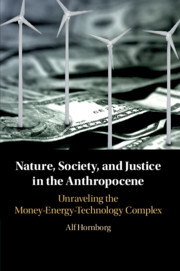Book contents
- Nature, Society, and Justice in the Anthropocene
- New Directions in Sustainability and Society
- Nature, Society, and Justice in the Anthropocene
- Copyright page
- Reviews
- Dedication
- Contents
- Figures
- Acknowledgments
- Introduction
- 1 Rethinking Economy and Technology
- 2 The Anthropocene Challenge to Our Worldview
- 3 Producing and Obscuring Global Injustices
- 4 The Money Game
- 5 Anticipating Degrowth
- 6 The Ontology of Technology
- 7 Energy Technologies as Time–Space Appropriation
- 8 Capitalism, Energy, and the Logic of Money
- 9 Unequal Exchange and Economic Value
- 10 Subjects versus Objects
- 11 Anthropocene Confusions
- 12 Animism, Relationism, and the Ontological Turn
- 13 Conclusions and Possibilities
- Afterword
- References
- Names Index
- Subject Index
8 - Capitalism, Energy, and the Logic of Money
Published online by Cambridge University Press: 24 June 2019
- Nature, Society, and Justice in the Anthropocene
- New Directions in Sustainability and Society
- Nature, Society, and Justice in the Anthropocene
- Copyright page
- Reviews
- Dedication
- Contents
- Figures
- Acknowledgments
- Introduction
- 1 Rethinking Economy and Technology
- 2 The Anthropocene Challenge to Our Worldview
- 3 Producing and Obscuring Global Injustices
- 4 The Money Game
- 5 Anticipating Degrowth
- 6 The Ontology of Technology
- 7 Energy Technologies as Time–Space Appropriation
- 8 Capitalism, Energy, and the Logic of Money
- 9 Unequal Exchange and Economic Value
- 10 Subjects versus Objects
- 11 Anthropocene Confusions
- 12 Animism, Relationism, and the Ontological Turn
- 13 Conclusions and Possibilities
- Afterword
- References
- Names Index
- Subject Index
Summary
To most people, money is like water is to fish – and yet it is a most peculiar invention. In this and the following chapter, I will elaborate my argument that its intrinsic logic is nothing less than capitalism. Marx seems to have been profoundly aware of this,1 which raises the question of why neither he nor most of his followers made the very artifact of money the primary target for reform.2 Although Marx and a minority of Marxists envisaged postcapitalist society as necessarily moneyless, such visions have universally been dismissed by practical politicians as utopian (Nelson 2001a). In contrast to so-called utopian socialists like Robert Owen, political regimes inspired by Marxist theory have generally not contemplated radically transforming the role of money.3 Yet money in its present form inexorably generates not only increasing global inequalities but also an appalling degradation of the biosphere. The basic conundrum of money is that it is simultaneously an idea, or sign (a unit of account), and a potent material force. Money is represented as a reflection of some underlying and more material level of reality to which it refers, yet it organizes that material reality. This duality explains Marx’s contradictory approach to money, as evident in his critique of utopian socialists like the Owenites, whose ambition to abolish money he dismissed as “useless and idealistic” (Nelson 2001b: 46). Rather than seeing money as the source and essence of capitalist property relations, Marx argued that money could only be dethroned by first transforming the social relations of production.
- Type
- Chapter
- Information
- Nature, Society, and Justice in the AnthropoceneUnraveling the Money-Energy-Technology Complex, pp. 137 - 150Publisher: Cambridge University PressPrint publication year: 2019

